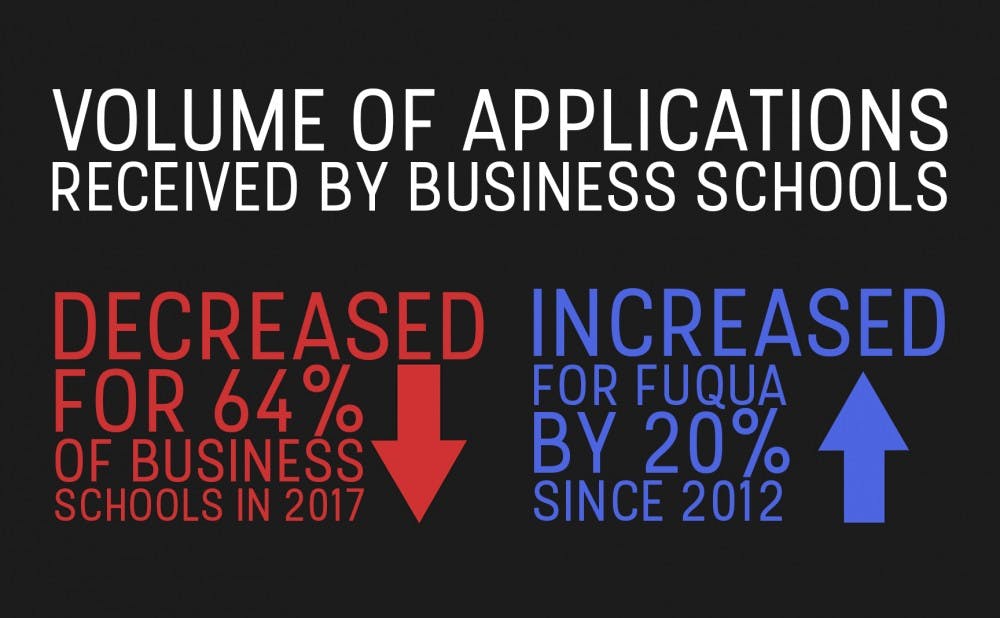Although business school applications are declining nationwide, Duke’s Fuqua School of Business has seen its applicant pool grow throughout the past five years.
Applications for Fuqua's full-time Master of Business Administration program were up more than 20 percent from five years ago, said Allison Jamison, the director of admissions for full-time programs at Fuqua. Other top-tier graduate business schools have seen applicant growth as well.
Still, the Graduate Management Admissions Council’s 2017 report showed that 64 percent of MBA programs across the United States saw declines in application volume. Fuqua Dean Bill Boulding believes this is indicative of a recent trend among business school applicants.
“In recent years, there has been a flight to quality in MBA programs,” he wrote in an email. “We’ve been fortunate at Fuqua that the interest in our programs remains exceptionally strong. However, I’d also add that we go to great lengths to make sure we are remaining relevant and delivering the kind of business education needed in today’s world.”
Boulding listed examples of those efforts, referencing a blockchain technology course taught by Cam Harvey, Fuqua professor of finance, and a new course by Aaron Chatterji, associate professor at Fuqua, about CEOs speaking out on political issues. He also mentioned a new certificate in data analytics, as well as a fully online master’s degree program in Health Analytics.
Maintaining a healthy international presence at Fuqua is another top priority for the school, Boulding wrote. There has been a decrease in international applicants to U.S. business schools across the country—75 percent of MBA programs reported a decline this year, according to the GMAC report. But Boulding noted that international students have sustained their interest in Fuqua because “prospective students recognize that Duke and Fuqua welcome people from all regions of the world.”
Applications from women and minorities have also grown faster than the general applicant pool, Jamison wrote in an email. Throughout the past five years, applications from women and minorities have increased by 32 and 24 percent, respectively.
Noelle Kelly, Pratt ’12 and Fuqua ’17, noted that she believes the business school also seems to accommodate people from a number of fields.
Kelly, now the director of business development at Nurse Care NC, went to Fuqua after graduating from Pratt and working for three years as a consultant. She added that people do not need a business background in order to go to business school—in fact, she said her class was filled with engineers like herself, public policy majors, teachers, technical professionals and even veterans. No matter what industry someone is working in, she said, an MBA degree program can help anyone advance to leadership positions.
“Also, [business school] forces you to think very deeply about what it is you want to do with your life and career… it's a deeply reflective experience,” she added.
For those who are interested in applying to business school, there are several things to keep in mind, said Milton Blackmon, associate dean of Trinity College and graduate school business adviser.
Blackmon said that business schools weigh objective and subjective factors fairly equally. Objective factors, he said, include undergraduate GPA and GMAT test scores, as well as the number of quantitative science courses taken. He recommended that those interested in applying to business school take more than the two QS courses required for graduation at Duke. Subjective factors include the essay, recommendations, community service, leadership and work experience.
The Fuqua admissions team in particular has their own set of criteria they assess when reading applications.
“First and foremost, an applicant must be true to him- or herself. Business schools do not want to read applications where applicants are trying to be who they think the business school wants them to be,” Jamison wrote. “Also, business schools want to know the reasons that a specific school is right for you, so being able to call out specific resources and experiences that a school offers that will help you reach your goals is key.”
Get The Chronicle straight to your inbox
Signup for our weekly newsletter. Cancel at any time.

Jake Satisky is a Trinity senior and the digital strategy director for Volume 116. He was the Editor-in-Chief for Volume 115 of The Chronicle.

